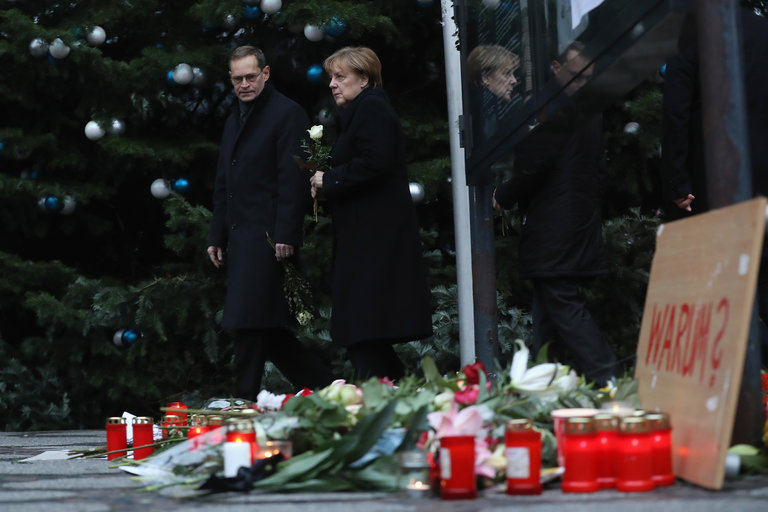BERLIN — She faced down a euro crisis that turned into an existential crossroads for the European Union. She confronted a Russian land grab in Ukraine. Virtually alone among her peers, she welcomed into her country roughly a million migrants who flooded across Europe’s borders.
Having made that fateful decision, Chancellor Angela Merkel of Germany now faces what nearly all here are calling the toughest passage of her 11 years in power, after a terrorist attack on Monday in Berlin left 12 people dead. ISIS has claimed responsibility, and the authorities are searching for a Tunisian man with Salafist ties.
The attack has rendered the chancellor, whose party has already suffered defeats in bellwether votes this year, still more vulnerable as national elections approach in 2017. A defeat for Ms. Merkel could have global consequences.
With right-wing populism on the rise across Europe, Ms. Merkel has been seen as a bulwark against illiberal democracy. If she is weakened, and if next spring’s election in France produces a populist president, the already weak European Union could be badly, even fatally, wounded.
“This is even more worrying than terrorism, strange though that may sound,” said Jacqueline Boysen, a biographer of Ms. Merkel who has known her since the 1990s. “Terrorism is terrible and frightening, but our political future is so uncertain.”
After Donald J. Trump won the election in the United States, she noted: “We don’t know what will happen in America, and what, for instance, Trump might do with Russia and China. Europe is not even taken into consideration, and that is really worrying.”
For now, Ms. Merkel’s main worry is at home, where the newspaper Bild tried to catch the national mood on Wednesday with a huge headline: “Angst!” or “Fear!”
Inside, the commentator Nikolaus Blome analyzed in greater depth, writing that it was up to politicians and especially Ms. Merkel to get a grip on terrorism. “That will be tough: She cannot count on the trust and confidence she long enjoyed but which is now not as certain as it was even two years ago,” he wrote. “She is certainly not the only one to blame. But many people in the country project their anger, their fear, on Angela Merkel, on her personally. So it will become her toughest test. And the end is wide open.”
Ms. Merkel has openly mused about her reluctance to run for a fourth term. But a sense of obligation — not just to her party and to her country, but also to Europe as populist forces gain pace — seemed to outweigh the obvious: Almost any democratic leader would be vulnerable to a desire for change after three terms in power.
If she wins a fourth four-year term, Ms. Merkel will rival her political patron, Chancellor Helmut Kohl, for longevity in office.
She, more than anyone, is aware of the odds. At a party congress where delegates signaled their unhappiness with her decision to admit roughly a million migrants, many of them Muslim, she demanded support: “You must, you must help me.”
Earlier, after her party lost two state elections in September, she even said she wished she could turn the clock back many years and revisit many aspects of immigration policy and security on Europe’s external borders.
That all reflected the danger she feels from the right-wing Alternative for Germany, which was established in 2013 as an anti-euro party but which swiftly pivoted in 2015 to an anti-migrant platform that has now propelled it into 10 of Germany’s 16 state legislatures.
Alternative for Germany has steadily eaten into the market share of Ms. Merkel’s mainstream, conservative Christian Democratic Union. This week, Alternative for Germany’s leaders wasted no time in blaming Ms. Merkel and her policies for the Berlin attack.
More ominously for the chancellor, Horst Seehofer, the leader of the Bavarian sister party to her Christian Democrats, demanded a complete overhaul of immigration and security policy.
Ms. Merkel, who still needs Mr. Seehofer’s party to back her run next year, has not responded, allowing others to criticize the Bavarian leader for seeking to make hay out of a terrorist attack.
Nonetheless, her cabinet on Wednesday swiftly passed an array of measures, first announced in August, to bolster domestic security, including extensive video surveillance of a kind common in Europe but rare in Germany, where memories of Nazi and Communist tactics mean citizens jealously guard their right to privacy.
Ms. Boysen saw the reaction as typical of Ms. Merkel. “She was never someone who let herself be guided by polls,” Ms. Boysen said. “Of course, that plays a part, but she is pragmatic. With this attack, she now has a new task to tackle. That is how she thinks.”
Ulrich Speck, a German analyst in Brussels for a Madrid-based think tank, Real Instituto Elcano, also argued that Ms. Merkel would simply deal with the new situation in an increasingly unpredictable world.
He cited her statement after Mr. Trump’s election in which she laid down conditions — including respect for everyone — for cooperating with the new president.
Domestically, Mr. Speck said, Ms. Merkel can draw on the continuing support for helping migrants. But, he noted, the attack on Monday had opened her to mounting criticism and lent her a rare impression of fragility.
“The feeling that someone is there who is managing it for us has gone,” Mr. Speck said, echoing Mr. Blome’s assessment of the chancellor’s rapport with voters.
“People are looking more closely, and there is a very vocal minority where there is really an anti-Merkel mood,” Mr. Speck said. But, he added, “I think she has the compass to sense where the middle is.”
However, Jackson Janes, an American expert on Germany with a Washington-based think tank, the American Institute for Contemporary German Studies, predicted that “she is going to have a real tough year.” Uncertainty abroad — in Europe and beyond — will help scramble German politics, too, he said.
The New York Times
